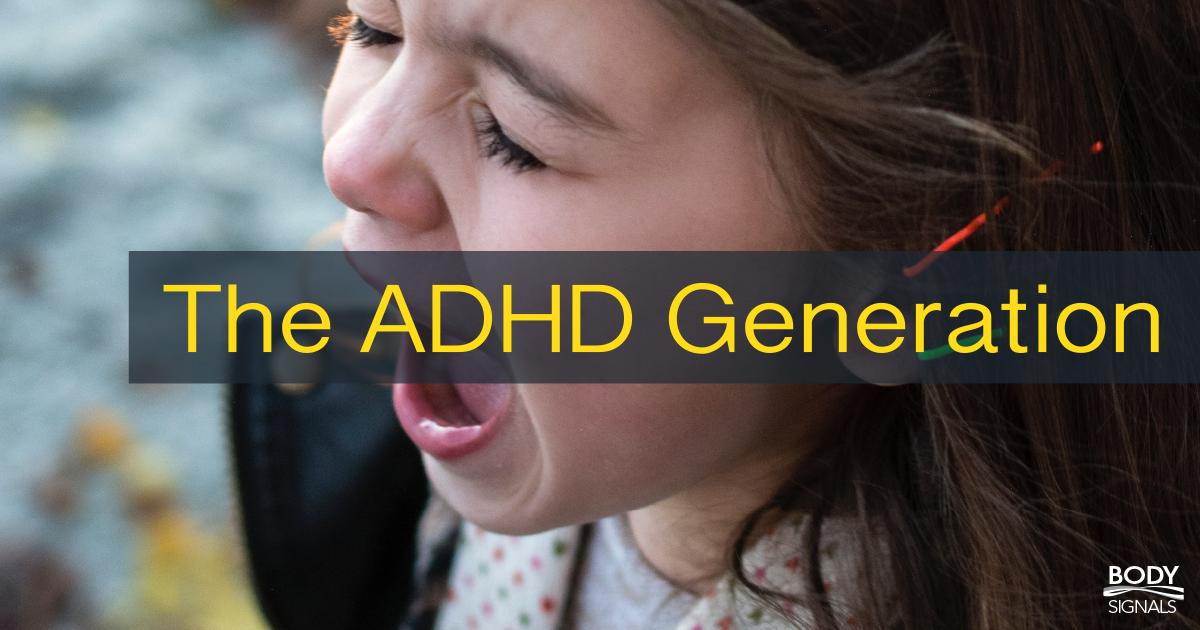A worrying conversation is picking up globally around “Gen Alpha,” and the headlines aren’t pretty. Studies on this generation’s mental and physical health are drawing a troubling picture of what could lie ahead. But first, let’s clarify who exactly Gen Alpha is.
Who is Gen Alpha?
Gen Alpha refers to children born after 2010, and the generation will include children born until around 2025. This generation is still in its early years, with most of them being pre-teens right now. What makes Gen Alpha unique is that they’re the first generation to grow up in a world completely saturated with digital technology. Smartphones, tablets, and endless screen time have been constant companions for these children since day one. But as this generation matures, we’re seeing a range of alarming trends that go beyond typical growing pains.
Here’s why experts, teachers, and parents are increasingly concerned about Gen Alpha.
1. Anxiety and Depression – In Children? Really?
Unsettling as it may sound, mental health issues like depression and anxiety are showing up in Gen Alpha earlier than anyone expected. And it’s not just isolated cases. Studies reveal that Gen Alpha children are more prone to mental health challenges than previous generations, and what’s even more disturbing is that some of these kids are attempting self-harm as young as 7 or 8. It’s almost unfathomable – what kind of stress could these children possibly be feeling at such an age?
In 2014, a five-year-old in Uttar Pradesh tragically passed away from heart failure while watching cartoons. In 2020, a healthy child in Egypt collapsed from a heart attack while playing. These cases are isolated, but they point to an unsettling pattern: younger children are facing levels of stress that are manifesting in ways unheard of a generation ago.

2. Tantrums on Another Level
If you thought temper tantrums were a typical phase, think again. With Gen Alpha, it’s a whole new ball game.
Teachers, parents, and caretakers are observing a troubling trend- Gen Alpha’s outbursts aren’t just about wanting a toy or more screen time. These tantrums escalate to extreme proportions. If their demands aren’t met, it’s not unusual for these kids to bang their heads against walls or destroy property. In some cases, the behavior is so intense that parents feel overwhelmed, struggling to discipline them.
There’s a sense that this generation, having had constant access to digital entertainment and instant gratification, may lack the coping mechanisms needed to handle “no” as an answer.
3. ‘Dumbness’ or a Lack of Real-World Knowledge?
Perhaps one of the most widely cited criticisms is Gen Alpha’s apparent lack of basic knowledge. And we’re not talking about advanced mathematics or complex vocabulary here. Teachers worldwide report that Gen Alpha students often struggle with basic skills and concepts.
There’s a video that went viral showing an Indian girl being asked how many alphabets there are in English – she answered, “I don’t know.”
Teachers have reported that some fifth-grade children with developmental delays are performing better academically than their seventh-grade non-disabled peers. A child was even quoted saying that milk comes from a phone! When it comes to grammar, spelling, and general knowledge, teachers are sounding the alarm – this generation’s understanding is shockingly limited.
The frustration is real, and it’s leading to burnout among teachers, with some deciding to leave their profession altogether. In some cases, the classroom environment has become so chaotic that children are verbally abusing teachers and even getting into physical altercations.
The Growing Call for Research and Solutions
The severity of these trends hasn’t gone unnoticed. Countries around the world are launching studies into Gen Alpha’s mental, physical, and cognitive development to better understand what’s going wrong – and more importantly, how to address it. But here’s the strange part- despite all these red flags, India hasn’t stepped up to the plate with any formal studies on Gen Alpha, even though these issues are cropping up in Indian classrooms and households as well.
Is it possible that a generation so thoroughly embedded in the digital world might be missing out on the real-world experiences that nurture resilience, empathy, and problem-solving skills? The signs are everywhere, and the world is beginning to realize the scope of the issue.
The iPad Generation – How Did We Get Here?
Gen Alpha is being called the “iPad Generation,” and it’s easy to see why. Devices like iPads, tablets, and smartphones are practically embedded in their daily lives. But how did something as seemingly harmless as an iPad contribute to such concerning issues?
Well, it turns out there are several ways in which these devices are affecting Gen Alpha’s development – and not for the better.
1. Overstimulation – A Recipe for Restlessness
In 2023, parents worldwide started voicing concerns about popular children’s shows like CoComelon, claiming it was causing more than just a few harmless tantrums. Some parents observed that their kids’ speech development was being delayed and that, in severe cases, children became so hooked on these shows that they’d hit themselves if they couldn’t watch.
Sounds like addiction, doesn’t it?
But it’s not just about CoComelon – short-form content like Instagram Reels and YouTube Shorts is pulling Gen Alpha into a vortex of endless, rapid-fire content.
According to reports, the average Gen Alpha child spends nearly three hours watching reels each day. With each reel lasting about 15 seconds, that’s roughly 360 to 480 reels in a single sitting!
But what does all this fast-paced, flashy content do to a young brain?
An experiment provided some insight.
Researchers exposed rats to constant, rapid flashes and sounds – mimicking the kind of stimulation kids get from screen time – for six hours a day over 42 days. The results were staggering.
Regions of the brain like the motor cortex and visual cortex were in overdrive, while areas crucial for cognition, memory, and emotional regulation – like the prefrontal cortex, hippocampus, and amygdala – were shutting down. Over time, these essential brain regions started to shrink, which can lead to long-term issues with critical thinking, memory, and decision-making.
Now, apply this to Gen Alpha. Growing up in this overstimulated environment means their brains may not be developing the skills they need to remember lessons, make decisions, or even socialize. They’re at risk of becoming a generation struggling with depression, anxiety, and loneliness.
What about cartoons, though? Are they bad too?
Not necessarily. It’s not the cartoons themselves but the constant, excessive viewing that’s causing problems. The bright colors, rapid movement, and stimulation from hours of screen time prime these kids to become dependent on the rush. When suddenly cut off, they react aggressively because their brains are craving that intense stimulation. So it’s not the shows but the screen time that’s harmful.

2. The Instant Gratification Culture – Leading to ADHD Symptoms
Gen Alpha is also known as the “instant gratification generation.” They’re used to getting what they want, and quickly. Unlike previous generations who had to wait for rewards – or simply accept not getting everything they wanted – Gen Alpha has everything at their fingertips.
Think about it- each “like” on a reel is a dopamine hit, a small burst of pleasure. But like any addiction, the thrill fades with time, leading kids to seek out more and more to feel satisfied. For previous generations, gratification was something you waited for. Remember waiting a whole week to catch a half-hour cartoon episode – commercials and all? Or having to save up and work for that one toy? That wait taught patience, persistence, and even appreciation.
In contrast, Gen Alpha has everything on-demand. If they want to watch a show, YouTube or Netflix is there instantly. Craving pizza? A few taps on Zomato or Swiggy, and it’s on its way. Want to talk to a friend? Facebook, WhatsApp, or Snapchat are right there.
This culture of instant pleasure is already having consequences.
Parents report that Gen Alpha kids struggle with patience and often lack resilience. What’s even more alarming is the link researchers are drawing between this instant gratification culture and ADHD-like symptoms.
Kids are constantly flipping from one piece of content to another, rarely holding their attention on one thing long enough to learn or process it fully. This habit is training their brains to crave constant novelty, which makes focusing on a single task or lesson feel nearly impossible.
ADHD Link
Parents and educators are sounding the alarm, pointing to behaviors in Gen Alpha that bear a troubling resemblance to attention-deficit/hyperactivity disorder (ADHD).
The dopamine-fueled cycle of instant gratification – tapping on a screen, liking a post, getting rapid feedback, scrolling through reels – trains young minds to expect immediate rewards. Over time, this “reward-seeking” rewires their brains, making it difficult for them to handle delayed gratification, focus on a task, or even tolerate waiting.
The fallout is evident in classrooms.
Teachers report that 7th-grade students struggle with concepts that used to be taught successfully in the 5th grade. Math basics, grammar, and critical thinking skills are increasingly challenging to grasp for students whose attention span has been continuously fragmented by screen time.
Parents report similar frustrations-if kids don’t get what they want when they want it, they can become triggered and aggressive. This behavior, tied to the dopamine bursts from continuous stimulation, is characteristic of ADHD symptoms and, worryingly, is becoming more common among Gen Alpha.
3. Lack of Sleep – A Generation Running on Empty
Another alarming issue facing Gen Alpha is chronic sleep deprivation. This isn’t just about being a bit sleepy during the day; lack of quality sleep is linked to serious health risks, including heart problems, obesity, and impaired growth.
This is a significant concern, especially when reports of heart attacks in young children are making headlines.
The problem starts with melatonin – a hormone naturally produced by the body in response to darkness, which regulates our sleep cycles and promotes healthy growth. As the day winds down, the body produces melatonin to signal that it’s time to rest, repair, and recharge.
However, Gen Alpha kids are often glued to their screens well into the night. The blue light from devices like phones and tablets tricks their brains into thinking it’s still daytime, disrupting the natural production of melatonin. This “daytime” signal keeps their minds alert and delays the onset of sleep.
The consequences of a disrupted sleep cycle are severe.
The adrenal glands, which release cortisol (often called the “stress hormone”), become hyperactive when the body doesn’t get enough sleep, raising heart rates and blood pressure. Over time, this heightened stress response can lead to heart issues and increase the risk of heart attacks, even in children.
5. The Unfiltered Exposure – Sexual Content and Online Dangers
Gen Alpha’s access to digital platforms like Instagram, YouTube, and TikTok means that age-inappropriate content is only a click away.
Algorithms that aren’t foolproof, combined with the vast range of user-uploaded content, means that explicit or sexualized content often reaches young viewers, despite parental controls or platform restrictions.
While social media giants claim to regulate inappropriate content, children often still encounter disturbing images, themes, or even adult interactions on these platforms.
The responsibility here is shared – tech companies must reinforce stronger protections, but parents and guardians also need to be vigilant about monitoring their children’s online experiences. Ensuring that Gen Alpha isn’t left alone to explore the internet is crucial.
The exposure to adult content can have lasting effects on children’s psychological well-being and can desensitize them to concepts they aren’t ready to understand.

Where Do We Go from Here?
The situation with Gen Alpha raises a big question-How do we ensure this generation can develop into well-rounded, resilient adults?
Simply put, we need a massive rethink in how we approach technology and children. That doesn’t mean banning screens entirely, but it does mean setting boundaries and being intentional with screen time.
Families, schools, need to take these issues seriously and work towards creating healthier environments that allow Gen Alpha to experience a balance of real-world learning, social interactions, and the self-discipline that comes from waiting for a reward.
In short, it’s time to bring the “real” back into Gen Alpha’s reality.
Gen Alpha is standing at a crossroads. We can guide them toward a future of creativity, resilience, and community – but only if we act now. Otherwise, we risk raising a generation more connected to their screens than to each other.
Time to Strike a Balance
We’ve reached a point where the question is no longer if technology impacts Gen Alpha negatively, but how we can mitigate these impacts while still letting them benefit from the positive aspects of technology. As they say, technology is a double-edged sword – it can be a boon or a bane, depending on how it’s used.
So, what can parents, educators, and society do?
Limit Screen Time and Encourage Outdoor Activities: Setting boundaries on screen time and encouraging kids to engage in outdoor play, sports, and creative activities are essential for their physical and mental health. These activities offer the brain a break from constant stimulation and help develop patience, focus, and resilience.
Promote Delayed Gratification: Teaching kids the value of waiting – for rewards, for achievements, for experiences – can be life-changing. Introduce “wait-and-reward” games, encourage hobbies that require patience (like gardening or crafts), and reward them for completing tasks over time rather than instantly.
Sleep Hygiene and Screen Curfews: Establishing a tech-free hour before bedtime can help kids wind down and ensure they get restful sleep. Instead of screen time, they could read a book or listen to calming music. Parents can also dim lights in the evening to signal the brain that it’s time for rest.
Parental Controls and Open Conversations: While parental control apps can help, nothing beats having open, non-judgmental conversations with children about what they see online. Encouraging them to talk about anything that confuses or upsets them online will allow parents to guide them effectively.
Moving Forward – A Balanced Future for Gen Alpha
Gen Alpha’s issues won’t be solved overnight, but each small step helps. We’re at a point where striking a balance between embracing technology and nurturing traditional developmental milestones is essential.
If we can promote resilience, patience, and the ability to engage with the real world, we’ll not only help Gen Alpha thrive but also set them on a path to become a balanced, healthier generation. The future of Gen Alpha doesn’t have to be a cautionary tale. It can be one of positive transformation – if we choose to guide them responsibly today.









